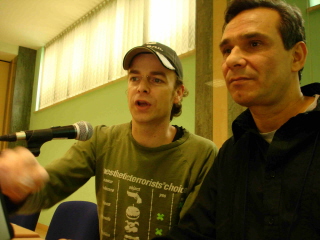Latest
Chronicle
Chronicle
Chronicle
Latest News
In The Trenches
FAMM urges Congress to heed message from Commission, New report finds crack disparity unjustifiable, up to Congress to fix the problem
WASHINGTON, D.C.: Federal crack cocaine penalties overstate the harmfulness of the drug, apply mostly to low-level offenders, and hit minorities hardest, concludes the U.S. Sentencing Commission in a new report to Congress, "Cocaine and Federal Sentencing Policy," released today, May 15. Based on these findings, the Commission maintains it's consistently held position that current crack cocaine penalties significantly undermine the congressional objectives of the Sentencing Reform Act, including fairness, uniformity and proportionality. The solution? Congress should act, says the report.
Mary Price, vice president and general counsel of Families Against Mandatory Minimums (FAMM), a national, nonpartisan sentencing reform organization, says, "The prisoners, children and families torn apart by these unjustifiably harsh penalties are watching closely and will welcome crack sentencing reforms that restore some justice to crack penalties. Only Congress can change our harsh mandatory minimum crack laws. Lawmakers should not squander the important opportunity presented by the most recent set of findings and recommendations by the Sentencing Commission. The time is ripe for reform, especially given the bipartisan support for crack sentencing reform that has emerged in recent years."
In its report, the Commission again unanimously and strongly urged Congress to act promptly on the following recommendations:
(1) Increase the five-year and ten-year mandatory minimum threshold quantities for crack cocaine offenses to focus the penalties more closely on serious and major traffickers,
(2) Repeal the mandatory minimum sentence for simple possession of crack cocaine and
(3) Reject addressing the 100-to-1 disparity by decreasing the five-year and ten-year mandatory minimum threshold quantities for powder cocaine offenses, citing no evidence to justify such an increase in quantity-based penalties for powder cocaine offenses.
In addition, the Commission seeks authority to incorporate any future changes to the mandatory minimums for crack into the federal sentencing guidelines.
FAMM strongly supports these recommendations and looks forward to working with members of Congress to implement these reasonable and long-overdue reforms to crack cocaine sentencing. Visit www.ussc.gov to read the report.
Event
Congressional Staff Briefing (Senate): Reforming Crack Cocaine Sentencing
On May 15, the United States Sentencing Commission (USSC) updated its 2002 Report to Congress on Federal Cocaine Sentencing. The USSC report once again finds that there is no rationale for the sentencing differences between the two forms of the drug. Under current law, possessing or selling 5 grams of crack cocaine results in the same five-year mandatory minimum sentence as selling 500 grams of powder cocaine. The law harshly punishes low-level offenders, and has had a disparate impact on African-American and low-income communities. Join us in a frank discussion on avenues for reform of this unjust law.
Event
Congressional Staff Briefing (House): Reforming Crack Cocaine Sentencing
On May 15, the United States Sentencing Commission (USSC) updated its 2002 Report to Congress on Federal Cocaine Sentencing. The USSC report once again finds that there is no rationale for the sentencing differences between the two forms of the drug. Under current law, possessing or selling 5 grams of crack cocaine results in the same five-year mandatory minimum sentence as selling 500 grams of powder cocaine. The law harshly punishes low-level offenders, and has had a disparate impact on African-American and low-income communities. Join us in a frank discussion on avenues for reform of this unjust law.
Latest News
Blog
Allan Clear Reports from the International Harm Reduction Conference in Warsaw
(DRCNet is pleased to welcome Allan Clear, executive director of the Harm Reduction Coalition, as a special guest correspondent for the Stop the Drug War Speakeasy. Allan is currently in Warsaw, Poland, attending the 18th International Conference on the Reduction of Drug Related Harm, and has graciously agreed to report for us on the proceedings. He has come through with photos and all. Because I was offline most of the last few days, Allan's first few posts are all coming out together in one. Any subsequent posts from the conference will come out one by one. Here Allan writes about getting to the place, the place, pre-conference meetings of the International Network of People Who Use Drugs and various satellite groups, and the conference's first day. - DB)
 Allan Clear
Allan Clear
 Stijn Goossens & Luiz Paolo Guanabara, at the conference
(Click the "read full post" link below or here to read Allan's full reports, with more pictures.)
Stijn Goossens & Luiz Paolo Guanabara, at the conference
(Click the "read full post" link below or here to read Allan's full reports, with more pictures.)
 Allan Clear
Allan Clear
 Stijn Goossens & Luiz Paolo Guanabara, at the conference
(Click the "read full post" link below or here to read Allan's full reports, with more pictures.)
Stijn Goossens & Luiz Paolo Guanabara, at the conference
(Click the "read full post" link below or here to read Allan's full reports, with more pictures.)Blog
Big News: Sentencing Commission Crack Cocaine Sentencing Report is Out
This issue has dragged on for too long -- I've been working on it since 1994, and that wasn't the beginning of it. Hopefully this new report from the US Sentencing Commission will help bring about some change, even if still woefully insufficient.
Commentary I have seen online at the time of this writing:
Prof. Doug Berman on the Sentencing Law and Policy blog Alex Coolman on Drug Law Blog Jeralyn Merritt on TalkLeft Families Against Mandatory Minimums press releaseAlso our feature story on USSC's recommendations to Congress on the issue, effective unless Congress votes to block them, Drug War Chronicle issue before last. Talk amongst yourselves... :)
Blog
Gaia-Murdering Psychopath
Peter Guither of Drug WarRant explains to drug czar John Walters why it is his prohibitionist policies that bear the root blame for endangering a rare hummingbird species in the Andes, not the coca growers as Walters' agency claims on their own blog.
Blog
Zero Tolerance for Zero Tolerance
Cenk Uygur blasts zero tolerance policies on the Huffington Post. Not a post about drugs, but of indirect relevance to the drug issue, where the zero tolerance concept comes up very often.
Blog
Initial Hurwitz Prosecutor Resigns from DOJ #2 Post
 |
|
Pagination
- First page
- Previous page
- …
- 1148
- 1149
- 1150
- 1151
- 1152
- …
- Next page
- Last page